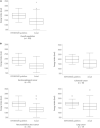Early impairment of food intake in patients newly diagnosed with cancer
- PMID: 36687669
- PMCID: PMC9849803
- DOI: 10.3389/fnut.2022.997813
Early impairment of food intake in patients newly diagnosed with cancer
Abstract
Background: Patients with gastrointestinal or lung cancer often suffer from a loss of appetite (anorexia), resulting in reduced food intake (hypophagia) and body weight loss. This study evaluated the prevalence of anorexia, hypophagia, pre-cachexia and cachexia in patients with cancer at time of diagnosis.
Patients and methods: Patients with newly diagnosed gastrointestinal or lung cancers were included. Body mass index (BMI) and weight loss over the prior 6 months were recorded. Patients were assessed for (pre-)cachexia and for anorexia using the Functional Assessment of Anorexia/Cachexia Therapy (FAACT) and a specific anorexia questionnaire (AQ). Energy and protein intake were calculated through food diaries. Patients were considered hypophagic if intake was ≤70% of guideline-recommended levels.
Results: Overall, 102 patients [53 male; median age: 67 (range, 21-88) years] were enrolled. Mean BMI (± standard deviation) was 23.1 ± 3.4 kg/m2; average percentage of weight loss was 10.1 ± 7.8%. At diagnosis, 68% (69/102) of patients had cachexia, and 11% (11/102) pre-cachexia. Prevalence of anorexia was 57% (58/102) and 75% (76/102) according to FAACT and AQ, respectively. Forty-eight percent (49/102) of patients had hypophagia. Patients with anorexia had lower daily energy (p = 0.002) and protein intake (p = 0.0257), and greater percentage of weight loss (p = 0.0005). In patients with hypophagia, negative correlations were observed between percentage of weight loss and total daily calorie (r = -0.40; p = 0.01) and protein intake (r = -0.340; p = 0.018).
Conclusion: Anorexia, inadequate nutritional intake and cachexia are highly prevalent in patients with gastrointestinal or lung cancer at diagnosis. Negative protein and energy balance may play an important role in the pathogenesis of cachexia. Early multimodal strategies to improve food intake are urgently needed.
Keywords: anorexia; cachexia; cancer; early assessment; food intake; hypophagia; weight loss.
Copyright © 2023 Molfino, Emerenziani, Tonini, Santini, Gigante, Guarino, Nuglio, Imbimbo, La Cesa, Cicala and Muscaritoli.
Conflict of interest statement
The authors declare that the research was conducted in the absence of any commercial or financial relationships that could be construed as a potential conflict of interest.
Figures


Similar articles
-
Validating Appetite Assessment Tools Among Patients Receiving Hemodialysis.J Ren Nutr. 2016 Mar;26(2):103-10. doi: 10.1053/j.jrn.2015.09.002. Epub 2015 Oct 28. J Ren Nutr. 2016. PMID: 26522141 Free PMC article.
-
Cancer-associated anorexia: Validity and performance overtime of different appetite tools among patients at their first cancer diagnosis.Clin Nutr. 2021 Jun;40(6):4037-4042. doi: 10.1016/j.clnu.2021.02.016. Epub 2021 Feb 23. Clin Nutr. 2021. PMID: 33676774
-
Quality of life and anorexia/cachexia in lung cancer: validation of the Spanish version of the FAACT instrument.Qual Life Res. 2018 Oct;27(10):2709-2718. doi: 10.1007/s11136-018-1930-4. Epub 2018 Jul 10. Qual Life Res. 2018. PMID: 29987501
-
Nutritional support in multimodal therapy for cancer cachexia.Support Care Cancer. 2008 May;16(5):447-51. doi: 10.1007/s00520-007-0388-7. Epub 2008 Jan 15. Support Care Cancer. 2008. PMID: 18196284 Review.
-
Definition and classification of cancer cachexia: an international consensus.Lancet Oncol. 2011 May;12(5):489-95. doi: 10.1016/S1470-2045(10)70218-7. Epub 2011 Feb 4. Lancet Oncol. 2011. PMID: 21296615 Review.
Cited by
-
Prognostic Value of the Modified Cachexia Index in Colorectal Cancer Patients Undergoing Curative Surgery.Cancer Diagn Progn. 2025 Jan 3;5(1):89-94. doi: 10.21873/cdp.10416. eCollection 2025 Jan-Feb. Cancer Diagn Progn. 2025. PMID: 39758240 Free PMC article.
-
High Protein Oral Nutritional Supplements Enable the Majority of Cancer Patients to Meet Protein Intake Recommendations during Systemic Anti-Cancer Treatment: A Randomised Controlled Parallel-Group Study.Nutrients. 2023 Dec 7;15(24):5030. doi: 10.3390/nu15245030. Nutrients. 2023. PMID: 38140289 Free PMC article. Clinical Trial.
-
Appetite Loss in Patients with Advanced Cancer Treated at an Acute Palliative Care Unit.Curr Oncol. 2024 Oct 10;31(10):6061-6072. doi: 10.3390/curroncol31100452. Curr Oncol. 2024. PMID: 39451756 Free PMC article.
-
The Impact of NUTRItional Status at First Medical Oncology Visit on Clinical Outcomes: The NUTRIONCO Study.Cancers (Basel). 2023 Jun 15;15(12):3206. doi: 10.3390/cancers15123206. Cancers (Basel). 2023. PMID: 37370816 Free PMC article.
-
Assessment of lipolysis biomarkers in adipose tissue of patients with gastrointestinal cancer.Cancer Metab. 2024 Jan 2;12(1):1. doi: 10.1186/s40170-023-00329-9. Cancer Metab. 2024. PMID: 38167536 Free PMC article.
References
LinkOut - more resources
Full Text Sources

